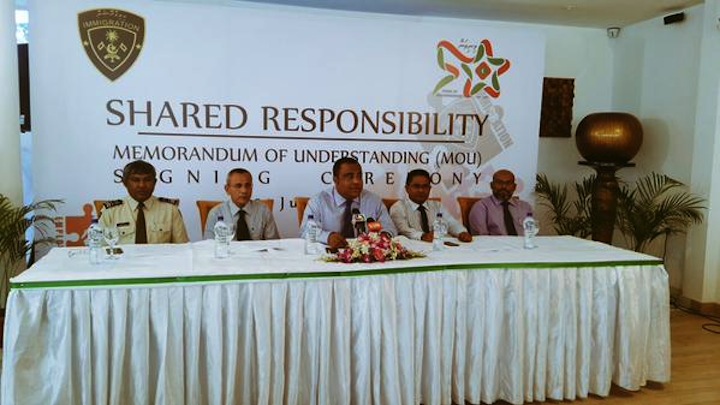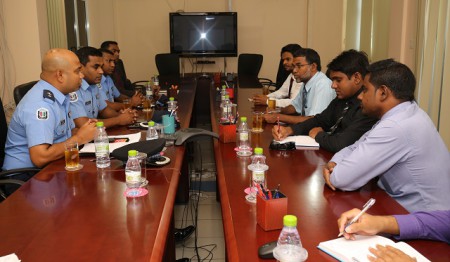The Human Rights Commission of Maldives (HRCM) has expressed concern over a pledge by immigration authorities to repatriate 10,000 “illegal” expatriates on the back of wider reservations at the treatment of foreign workers potentially trafficked into the country.
HRCM member Jeehan Mahmoud has told Minivan News that the commission was concerned not just over plans to repatriate a predetermined number of unregistered workers, but also whether they were being punished for the actions of employers or agents acting outside the law.
The concerns were raised as the Department of Immigration and Emigration announced yesterday (April 30) that 1,748 foreigners found to be working illegally in the country had been repatriated – the majority by their own request – during the year so far.
Immigration officials also announced commitments to send a further 10,000 unregistered workers back to their home nations during the remainder of 2013.
Immigration Controller Dr Mohamed Ali said that the repatriated workers had either come to the Maldives with sufficient funding to afford transportation back to their home countries, or that their fares were covered through previously paid “deposits”.
Dr Ali did not however elaborate as to how the immigration department had devised the figure targeting the return of 10,000 unregistered workers to their respective countries.
He stressed that his department would be investigating and punishing employers and agencies responsible for bringing the now unregistered workers to the country if they had acted illegally.
“[The immigration department] will do that with vigour now,” he said.
Dr Ali was reported in local media as adding that 146 foreigners alleged to have involvement in criminal cases were deported this year so far, with 85 illegal workers also sent back to their respective home nations.
“More foreigners come to us voluntarily as we toughen our approach towards them. Everything will be arranged for those who come to us voluntarily. Island Aviation now has direct flights to Dhaka,” he told Sun Online, referring to the large number of Bangladesh nationals working in the country.
Dr Ali told Minivan News last week that while almost all foreign workers coming to the Maldives arrived under registered companies, some were finding themselves “illegally used” by employers due to “systematic abuse” of the visa system once here.
HRCM investigation
Responding to the immigration controller’s pledge this week, HRCM member Jeehan said that the commission itself had not been consulted by the Immigration Department over its proposed crack down on unregistered workers.
From the perspective of the HRCM, Jeehan said there was particular concern about the safety and vulnerability of the foreign workers set to be returned by authorities, particularly in the case of expatriates who were heavily in debt as a result of paying companies or agents to come to the country to find work.
“If they are working or staying here undocumented, how safe are they to be returned home,” she said. “We must consider how vulnerable some of these people are, it is different for those who request repatriation or course.”
The HRCM is now set to investigate the conditions by which these foreign workers are being repatriated, especially in regards to concerns that unregistered expatriates may have been detained as a result of the actions of agents or employers in the country.
According to Jeehan, issues also needed to be addressed over how the Immigration Department had decided to set a predetermined number of foreign workers that it would look to repatriate.
“How has the state arrived at this number? Whether it is the result of a baseline study or some other research we need to know,” she said. “Also, how is the state identifying the 10,000 workers that need to go back home and are they sure they are undocumented? Questions also need to be asked of what the state is doing with these expatriates before they are sent home. It is unfair if they are being detained as a result of the faults of others.”
Jeehan added that before any undocumented foreign workers were being repatriated, it was also important to ensure that employers had paid the salaries of all staff and were honoring their obligations to workers.
“These employees should be provided with their due wages and compensation, it is for the state to guarantee this,” she added.
Jeehan said that the HRCM was presently seeking to consult the Labour Relations Authority (LRA) over a number of issues that it said would include how unregistered workers were being sent out of the country.
“We will look to meet with the LRA first, as they are the state authority outlining employment practices, s we can see what role they may have had in outlining these policies,” she said.
Jeehan added that if the LRA has not had a role in the outlining this repatriation policy, than the HRCM might “have an issue” with the process.
When contacted by Minivan News today, LRA Assistant Director Aishath Nafa Ahmed said the body had no involvement in outlining policies on the repatriation of foreign workers since last year.
She added that although the LRA was involved in a steering committee that focused on issues surrounding the country’s foreign workforce, the authority had not had any discussions over plans to repatriate 10,000 workers this year.
Human trafficking
The Maldives has appeared on the US State Department’s Tier Two Watch List for Human Trafficking for three consecutive years. Should the Maldives drop to tier three – the worst category – then the country is expected to face significant reductions in aid and potential travel restrictions on its citizens.
Despite the government last year launching a special state program to try and draw awareness to the problems beyond human trafficking, concerns have continued to be raised by various NGOs and authorities at the scale of human trafficking in the country amidst fears of widespread corruption within the visa system.
Just last month, a source working within the immigration department alleged that companies across the Maldives were freely abusing visa regulations by generating fictitious labour demand to directly profit from trafficking foreign workers into the Maldives.
The source told Minivan News that almost no human verification was being undertaken by authorities to ensure workers were genuinely employed once a business or construction project was approved in the country.
In theory, a Maldivian company could submit design plans for an existing structure such as Manchester United’s 75,811 seat Old Trafford Stadium – and then be assigned a computer-generated quota of foreign workers, the same source claimed.
One former Bangladesh High Commissioner in the Maldives alleged back in 2010 that the exploitation of foreign workers in the country rivalled fishing as the most profitable sector in the national economy after tourism.
Addressing the current scope of unregistered foreign labour, Maldives Association of Construction Industry (MACI) former President Mohamed Ali Janah said earlier this year that an estimated 40 percent of the foreign employees in the sector were thought not to be legally registered.
Considering these numbers, Janah said he could not rule out the involvement of organised crime in certain employment agencies, which supply a large amount of foreign labour to building sites in the Maldives.
Likes (0)Dislikes
(0)Dislikes (0)
(0)
 (0)Dislikes
(0)Dislikes (0)
(0)

